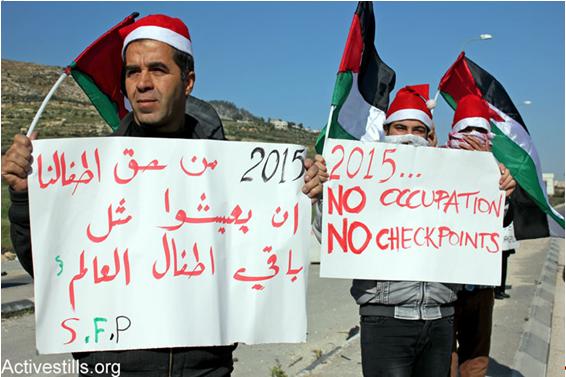Samah Abd al-Muamen Abdallah, an 18-year-old Palestinian from the village of Ammuriya, was shot and killed in November 2015 on her way home from Nablus, where she was training as a cosmetician. As Abdallah and her family approached Huwwara checkpoint in their car, Samah, who was sitting in the backseat with her siblings, was struck in the head by a bullet fired by a soldier that penetrated the vehicle’s window pane. She died from her wound three weeks later at Beilinson Hospital in Israel. The military later explained that the soldier had fired the shot after a Palestinian tried to stab Israeli civilians with a knife at a hitchhiking post near the checkpoint, and that the bullet had apparently struck Samah by mistake.

Palestinians at the Huwwara checkpoint demonstrate against unaccountable military violence. The sign in Arabic reads: “It is our children’s right to live just like all the other children of the world.” (Photo: Activestills)
Official Israeli military policy requires an investigation of every incident resulting in the death of a Palestinian civilian, with the exception of incidents that are “clearly part of a combat situation.” The military refused to investigate the circumstances of Samah’s death because they purportedly constituted a “combat situation.”
After complaints to the Corps of the Military Advocate General (MAG) and the Attorney General failed to result in an investigation, Samah’s father, Abd al-Muamen Abdallah, petitioned the Israeli Supreme Court with the assistance of the NGO Yesh Din – Volunteers for Human Rights.
The petition argued that the MAG’s definition of a “combat situation,” which includes a violent action by an individual without a firearm, does not comply with international law, with the recommendations of the Turkel Commission – the inquiry set up by Israeli Government to investigate the Gaza flotilla raid, and the Blockade of Gaza – or even with the MAG’s own definitions. As such, it renders the Attorney General’s commitment to the Supreme Court to investigate the deaths of Palestinian civilians effectively meaningless.
The petition reiterated the distinction made in international law between clear-cut combat situations and civilian incidents, such as disturbances of the peace or individual acts of violence, to which the appropriate response is enforcement through policing. Although this distinction is not always easy to uphold in practice, it makes sense that incidents, which are “clearly part of a combat situation,” should involve actual combat, such as armed forces firing at each other. In the reality of military occupation, especially if it is drawn out, the distinction is clearly much sharper, given the occupying power’s duty to keep the peace in the region.
The petition further argues that when a lone perpetrator attempts to stab or run over civilians, such as in the incident that led to Samah’s death, the attack does not belong to the category of a combat situation but rather to cases of sporadic violence, disturbances of the peace and riots, to which the forces respond with policing, rather than combat, activity.
The decision not to investigate this case, in breach of official policy, is not unusual. According to figures compiled by B’Tselem – The Israeli Information Center for Human Rights in the Occupied Territories, 69 Palestinians were shot and killed by Israeli soldiers in the West Bank in 2015, but only 21 investigations were opened. Many of the incidents took place in the context of the violence that erupted in the West Bank that year. In 2016, 56 Palestinians were shot and killed by Israeli soldiers in the West Bank, yet only 10 investigations by the Military Police’s Criminal Investigation Division (MPCID) were immediately launched as stipulated in Israeli military’s investigation policy.


